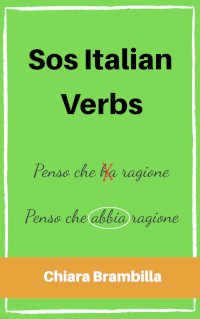
Sometimes it happens that even Italians are beset by doubts when they have to use some verbs.
If you too are beset by doubts about some Italian verbs, you don’t have to worry anymore because today I’m going to help you solve some of these doubts.
1. APRIRE
One of the linguistic doubts that can hit native Italian speakers concerns the passato remoto of the verb aprire.
What’s the first person singular?
Now, I’ve always said aprii/aprì – which is right, don’t worry – however, some weeks ago I heard an old man saying apersi, and I thought “What? Apersi? It’s wrong, it doesn’t exist!”.
When I got home, I did a small research, and you know what? I was wrong!
It seems that apersi is a perfectly acceptable form, although aprii/apersi is definitely much more used nowadays.
So, if you still have to learn it, it’s better you learn aprii/aprì. However, if you happen to say apersi, just remember that it’s not wrong, maybe only a bit strange to hear.
2. CUOCERE
Cuocere is one of my favourite Italian verbs and not only because it’s usually related to food but also because the passato remote of this verb is usually considered a little bit strange and difficult to remember.
Indeed, if you’re thinking that the first person singular is cuocei – it does sound nice, doesn’t it? – you’re wrong.
The correct form is cossi. Yes, you read it right, cossi. And the whole conjugation is cossi, cuocesti, cosse, cuocemmo, cuoceste, cossero.
What about the past participle?
The past participle is cotto, not cuociuto.
You’re starting to love this verb, I can feel it!
3. DARE
Let’s keep talking about the passato remoto. What is the first person singular of the verb dare?
What? You’re saying diedi? Nope? You’ve just changed your mind, and you’re now betting on detti?
Ok, it seems like you’re confused now, but don’t worry you’re in good company.
The good news is that both forms are correct. You can choose diedi or detti, knowing that the first one is usually more used than the second.
Do you want to learn all the Italian verb tenses? Have a look at my book Sos Italian verbs
4. DOVERE
If you are beset by doubts about Italian verbs, chances are these doubts don’t concern only the passato remoto but also the present tense, maybe the present tense of the verb dovere.
What’s the first person singular of this verb, devo or debbo?
Both forms are correct. However, devo is generally more used than debbo.
Pay attention because also the present subjunctive of the verb dovere has two possible forms. The first one, which is much more used, is debba, debba, debba, dobbiamo, dobbiate, debbano. The second one is deva, deva, deva, dobbiamo, dobbiate, devano.
What about you? Are you beset by doubts when you have to use some Italian verbs? What are the most common mistakes you make?
Credits
Original image Fran__





 New archeological discoveries in Italy
New archeological discoveries in Italy

